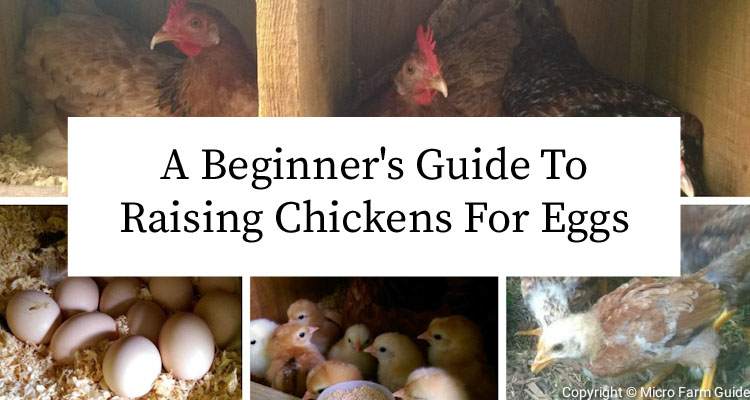Did you know that one happy hen can lay over 300 eggs annually? That’s a lot of eggs!
But it’s not just about eggs. Chickens can also help you create nutrient-rich compost, fertilizers, mulch, and other soil amendments for your garden.
Now, these are more than enough reasons to raise chickens for eggs. But how do you get started?
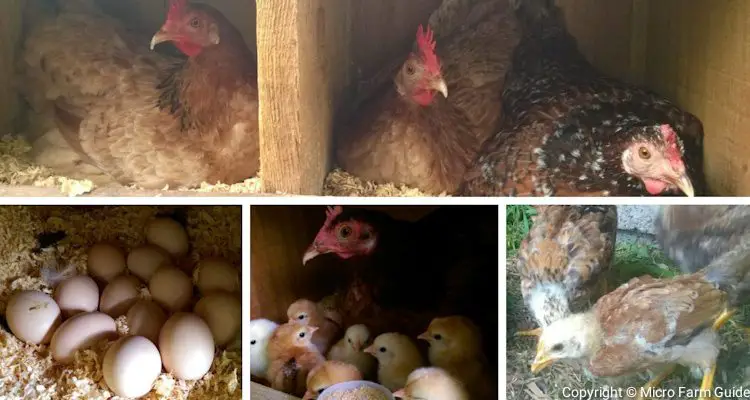
In this beginner’s guide, you will learn everything you need to know about raising chickens — from choosing the correct breeds to creating a suitable coop, caring for your chicks, and much more.
But before we do, we must determine whether you can raise chickens in your area.
Research Local Poultry Rearing Regulations
Before you start raising chickens, you need to research your local regulations.
Find out if you’ll have any limits on the placements, size of coop, or the types and number of chickens you can raise.
In certain regions, rules might be in place to protect against the spread of endemic diseases, which could wipe out your entire flock.
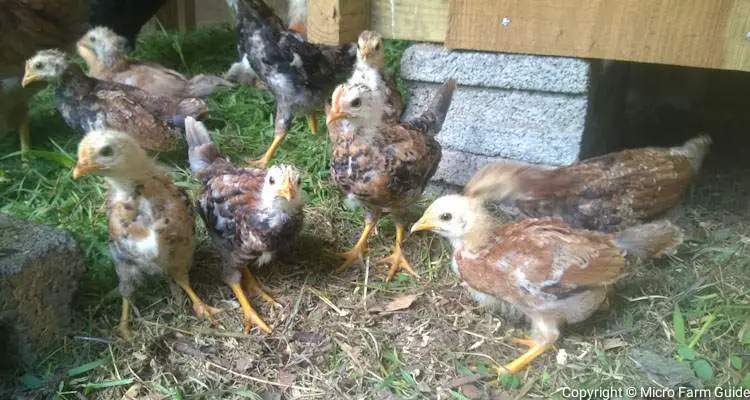
You should be able to find this information at your local agricultural office, H.O.A., and sometimes online.
Once you’ve taken care of this, it’s time to get back to the fun part of your journey.
Select The Right Breed Of Chickens For Eggs
The type of chicken you choose can make a big difference in your egg-laying venture. Ideally, you should pick a breed that is suited to laying eggs.
For backyard flocks, you can consider dual-purpose breeds like Rhode Island Reds, White Leghorns, and Buff Orpingtons.
However, if you intend to focus solely on eggs, consider a commercial layer such as I.S.A. Brown (hybrid).
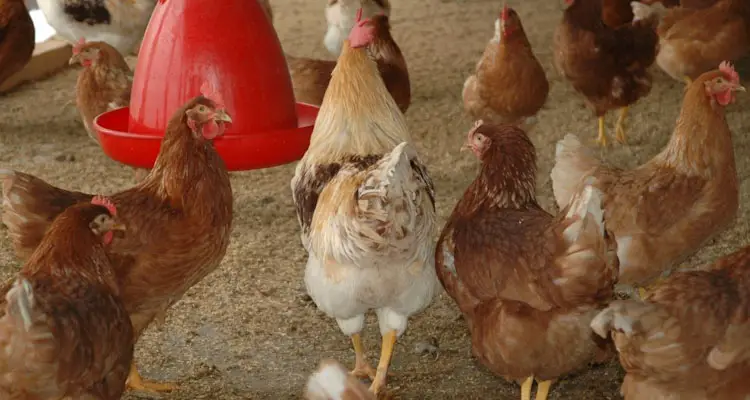
Ultimately, you’ll have to choose what’s available in your area and their ability to adapt to the local weather.
That said, avoid “yard fowls” for now since their egg production is a bit unpredictable.
Afterward, you’ll need to consider the type of housing you’d prefer.
Setting Up A Coop (Chicken House)
Chickens need a comfortable and secure home to rest, lay eggs, and stay safe. It’s best to make your coop from sturdy materials such as timber and chicken wire, ensuring it is easy to clean.
Keep the design simple and suitable for your climate. You can even use reclaimed materials.
For example, we used 2 x 2 timber, galvanized sheets, and chicken wire for our demo coop.

Ensure your structure has enough space to move around; typically, at least 2 square feet per bird. However, I prefer allotting up to 10 square feet per chicken, since my coops don’t have a separate run.
Ideally, it should be at least 8 feet tall, with the first 18 inches intended to hold the bedding material, which turns into compost over time.
The coop’s design and location should protect your chickens from weather and predators. You can also install a footbath tray at the entrance of the coop. This will allow you to disinfect your shoes before entering the chicken coop.
You can find several coop designs online, including designs for insulated structures, which come in handy for colder regions.
Nest Boxes Set Up For Clean Eggs
The secret to collecting clean eggs is managing your nesting boxes and perches.
For example, a nesting box should measure at least 12 x 12 x 12 inches and be elevated at least 1 foot off the ground.
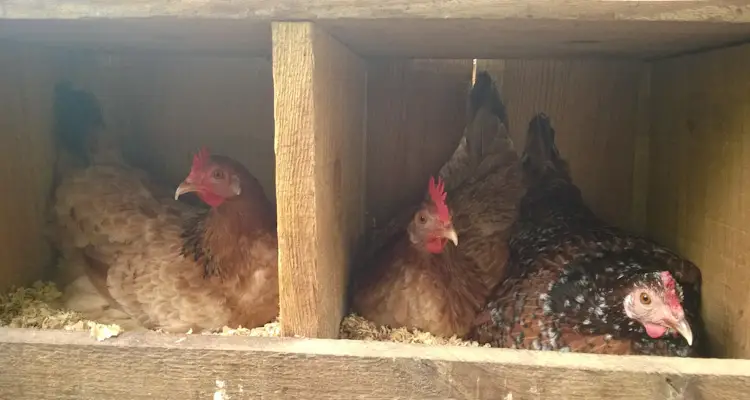
Chickens instinctively lay where they feel comfortable and secure and roost on the highest structure possible.
So, you must ensure that the perches are higher than the nest box to keep the chickens from going inside unnecessarily.
Also, providing at least 1 nesting box per four chickens is recommended. However, you may have to increase this number based on the breed.
Finally, keep the box filled with clean bedding material, collect the eggs daily, and store them properly.
Feeding and Nutrition
Chickens are omnivores and need a balanced diet. This can include commercial feed, grain, grass, vegetables, insects, kitchen scraps, and other edibles.
However, initially, you will be relying on commercial or organic feed, according to the age of your chicks.
For example, you can purchase pullet starter, pullet grower, and layer feeds from local supplies. So, it’s essential to understand your chicken’s dietary needs and stage of growth.
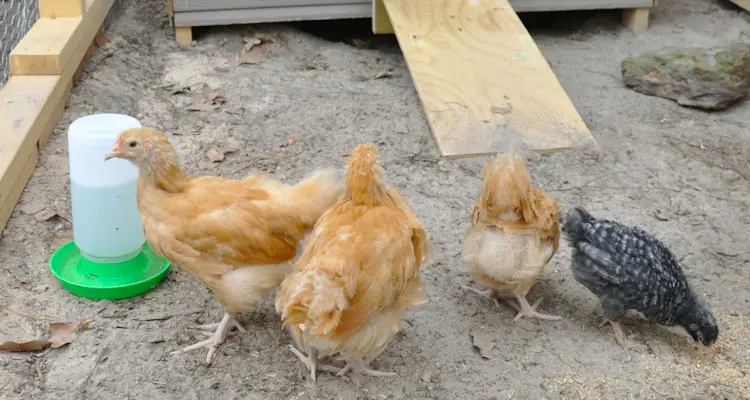
Also, ensure your chickens have access to fresh, clean water at all times, and stick to a consistent feeding schedule to deter aggressive behavior.
Now that you know what your chicks need to eat, let’s look at how to care for your chickens.
How To Raise Chickens For Eggs (Simple Guide)
Raising baby chicks is a delightful but delicate task. These little fluff balls need special care, warmth, and proper nutrition.
First, you need to set up a brooding area using a heating lamp or cardboard box. In our case, we use older hens to foster chicks, saving us money in the process.
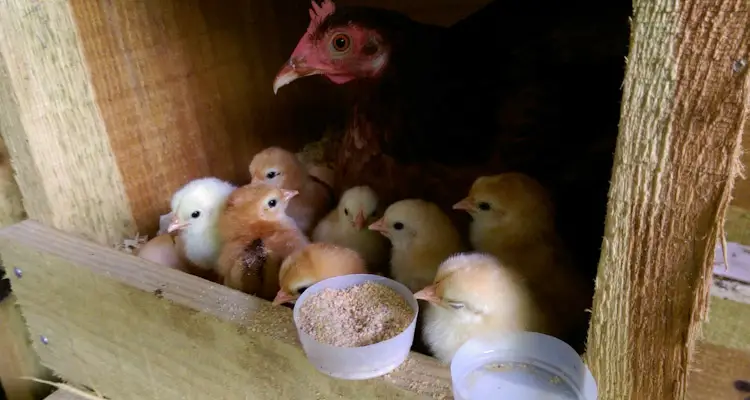
Brand-new baby chicks need temperatures around 95°F, and can tolerate a decrease of 5°F per week until they reach about 10 weeks.
Start feeding your baby chicks with brown rice, tiny grass clippings, and water mixed with garlic and some raw vinegar for the first day or two.
Afterward, ensure you provide your layer chicks with clean water and a quality feed they can access as they wish.
Of course, this will vary based on their stage of growth, so let’s take a look.
Stages of Layer Chickens Development
Chickens go through different stages of development, from baby chicks to pullets and laying hens.
Understanding these stages will help you take better care of your flock, providing suitable housing and nutrition. For example:
| Stage | Age | Feed | Notes |
| Baby Chicks | 0 to 8 weeks | Pullet Starter | Keep Chicks Warm |
| Pullets | 8 to 16 weeks | Pullet Grower or Organic Grain | Add Garlic, Lemons, or APV to water. |
| Point Of Lay | 16 to ~22 weeks | Pullet Grower or Organic Grain | Supplement with vegetables, kitchen scraps, and wild grass. |
| Laying Hen | 22 weeks+ | Layer Pellets or Organic Grain | Provide additional calcium e.g. ground eggshells, oyster shells, etc. |
Of course, these stages will differ based on the breed of the chicken. However, this should give a general guideline of what to expect.
When Will Chickens Start Laying Eggs?
Some hens will begin laying eggs as early as 18 weeks of age, while others might take as much as 32 weeks.
As you can see, the expected time varies considerably. This difference is due to the breed, health, and the environment.
As a result, even within the same batch, not all hens will start laying at the same time.
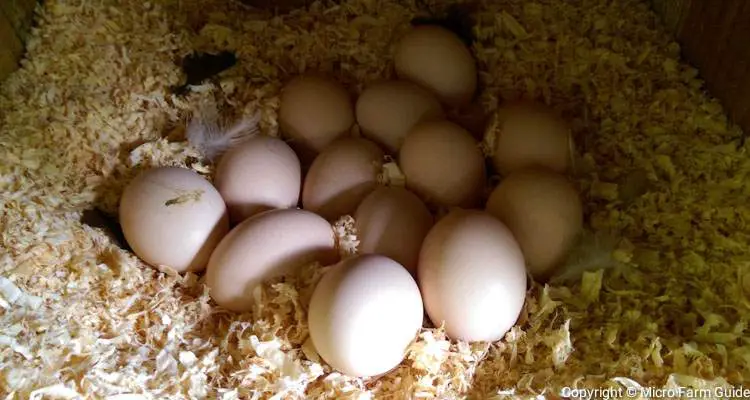
So you’ll have to be patient and remember that you will have to feed your chickens continuously while you wait.
Now, do you understand why choosing the right breed of chicken is essential?
How Long Will Chickens Lay Eggs?
On average, chickens will lay eggs for about 2 to 4 years, but some breeds, like heritage chickens, can go even longer.
As they age, hens may lay fewer eggs until they eventually stop. As a result, you will need to plan for this by periodically introducing new chicks or pullets to the flock.
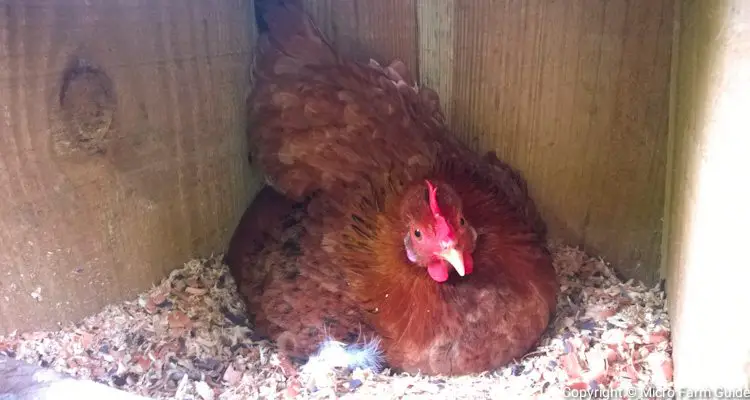
Before they stop laying, you should decide whether you want to sell or keep them to assist with raising new chicks or turning compost.
Either way, you must plan for this in advance since some breeds of chickens can live up to 20 years or more. The numbers can add up over time!
Troubleshooting Common Issues
As mentioned, chickens can live for a long time; not everything will go as planned during this time.
Thankfully, you can avoid most issues by keeping the coop clean and well-ventilated and providing enough food, space, and water daily.
However, you must monitor your chicks for signs of injury or sickness, such as limping, loss of feathers, discomfort, sneezing, runny nose, or abnormal behaviors.
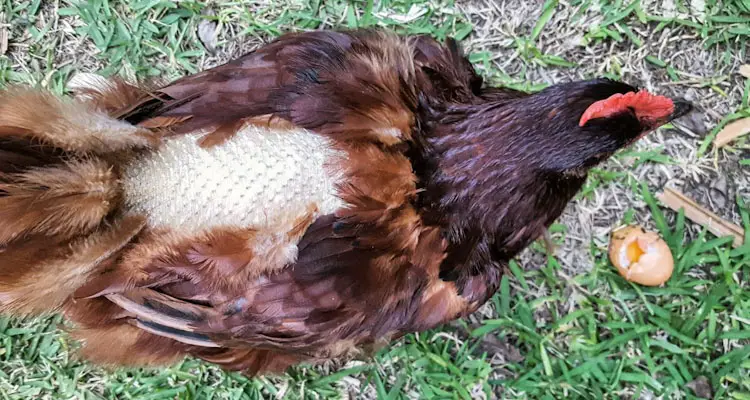
If you notice a chicken is unwell, isolate them from the others and clean the feeders and waterers as a precaution.
Observe the coop for signs of molting, excessive dust, and bullying to rule out seasonal changes, allergens, and aggressive interactions as possible causes.
Then, increase the frequency of adding garlic, aloe vera, and lemon to the water to help boost the immune systems of the other chickens.
This might help to prevent illness from spreading initially. Still, you should contact a vet or extension office if you notice additional symptoms developing.
Final Thoughts
If you’re interested in raising chickens for eggs, you now have the knowledge to take your first step.
Remember to choose the right breeds, create a comfortable coop, feed them well, and enjoy your tasty eggs.
If you have any questions or need more tips, please get in touch with us. Visit our Natural Farming Page for additional information and guidance. All the best!
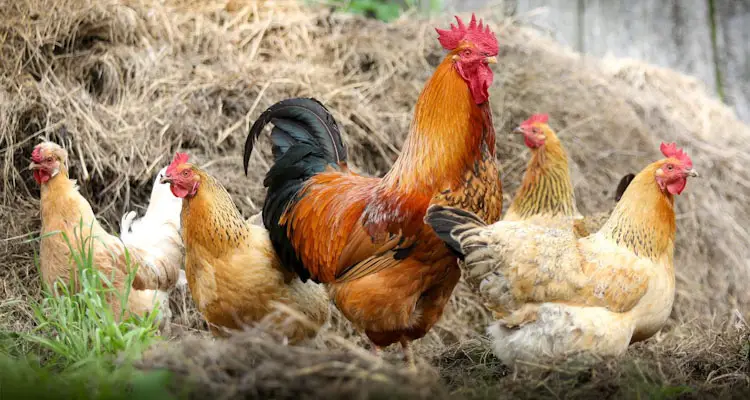
Related Questions
1. Is raising chickens worth it for eggs?
Yes, raising chickens for eggs is worth it, provided you choose suitable breeds and have alternative food sources and a plan for what to do with the chickens after they stop laying.
2. How many chickens should I raise for eggs?
You’ll need about 3 to 4 layer chickens to produce about one dozen eggs per week. However, this will vary based on various factors, including the breed and age of the chickens and the time of the year.
3. What are the easiest chickens to raise for eggs?
I.S.A. Brown hybrids are the easiest chickens to raise for eggs. They are docile, easily managed, and can lay about one egg every 25 hours. However, this production frequency comes at a cost.
4. What do you feed chickens to get more eggs?
The amount of eggs chickens can lay is determined primarily by the breed of the chickens. However, you can ensure quality eggs by feeding chickens a balanced diet with layers’ pellets, wild grasses, grains, kitchen scraps, and Calcium-rich foods.
5. Can chickens lay eggs without a rooster?
Yes, hens can lay eggs without a rooster. However, the eggs will be infertile — unable to produce baby chicks. The rooster is needed primarily to fertilize eggs, but also serve to help protect the flock and keep the peace.
References
University Of Minnesota Extension. Raising Chickens For Eggs. extension.umn.edu. Accessed October 2023
Extension. Raising Chickens For Egg Production. poultry.extension.org. Accessed October 2023
IFAS Extension. Raising Backyard Chickens For Eggs. edis.ifas.ufl.edu. Accessed October 2023
N.C. State University. Want To Raise Your Own Chickens? ces.ncsu.edu. Accessed October 2023

